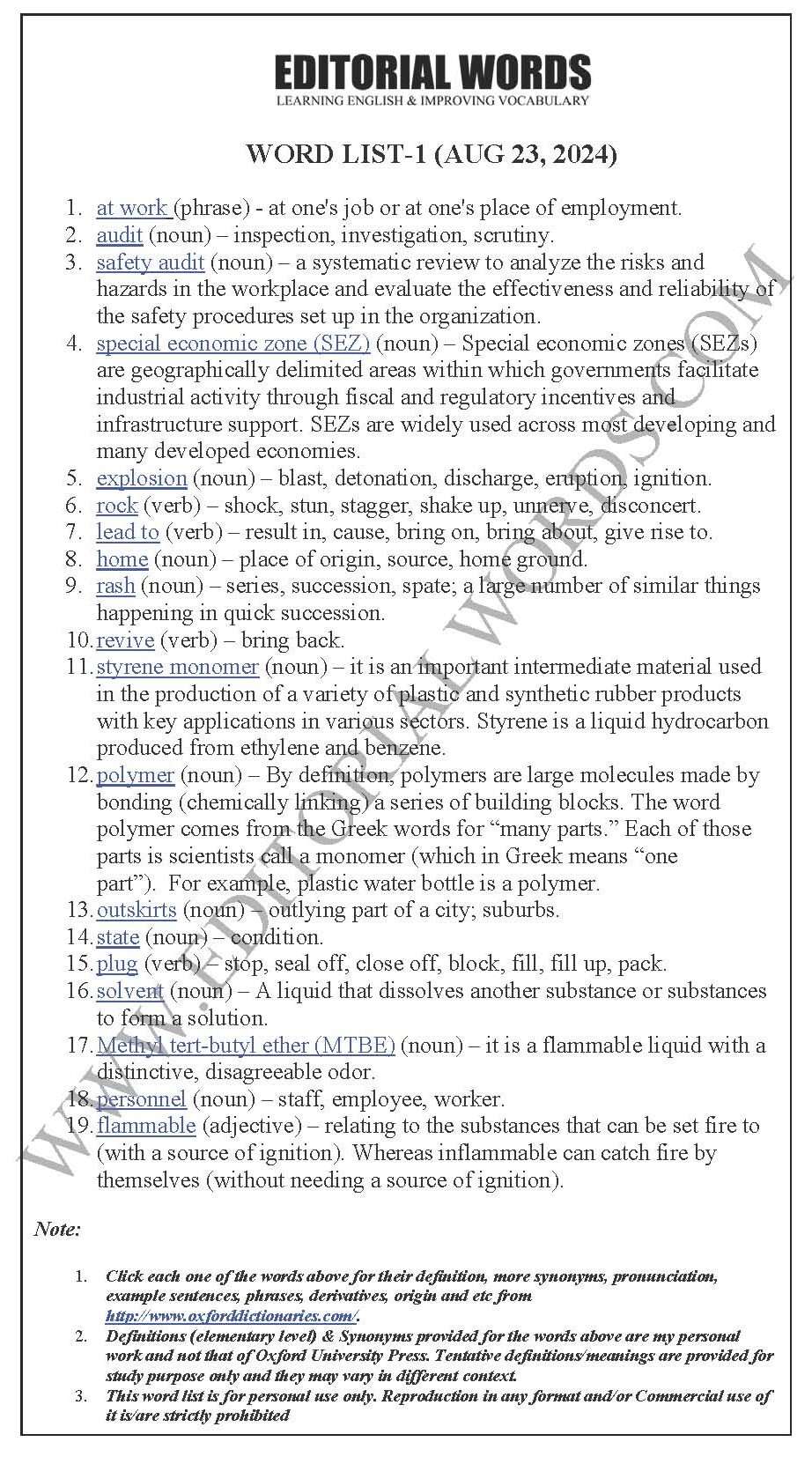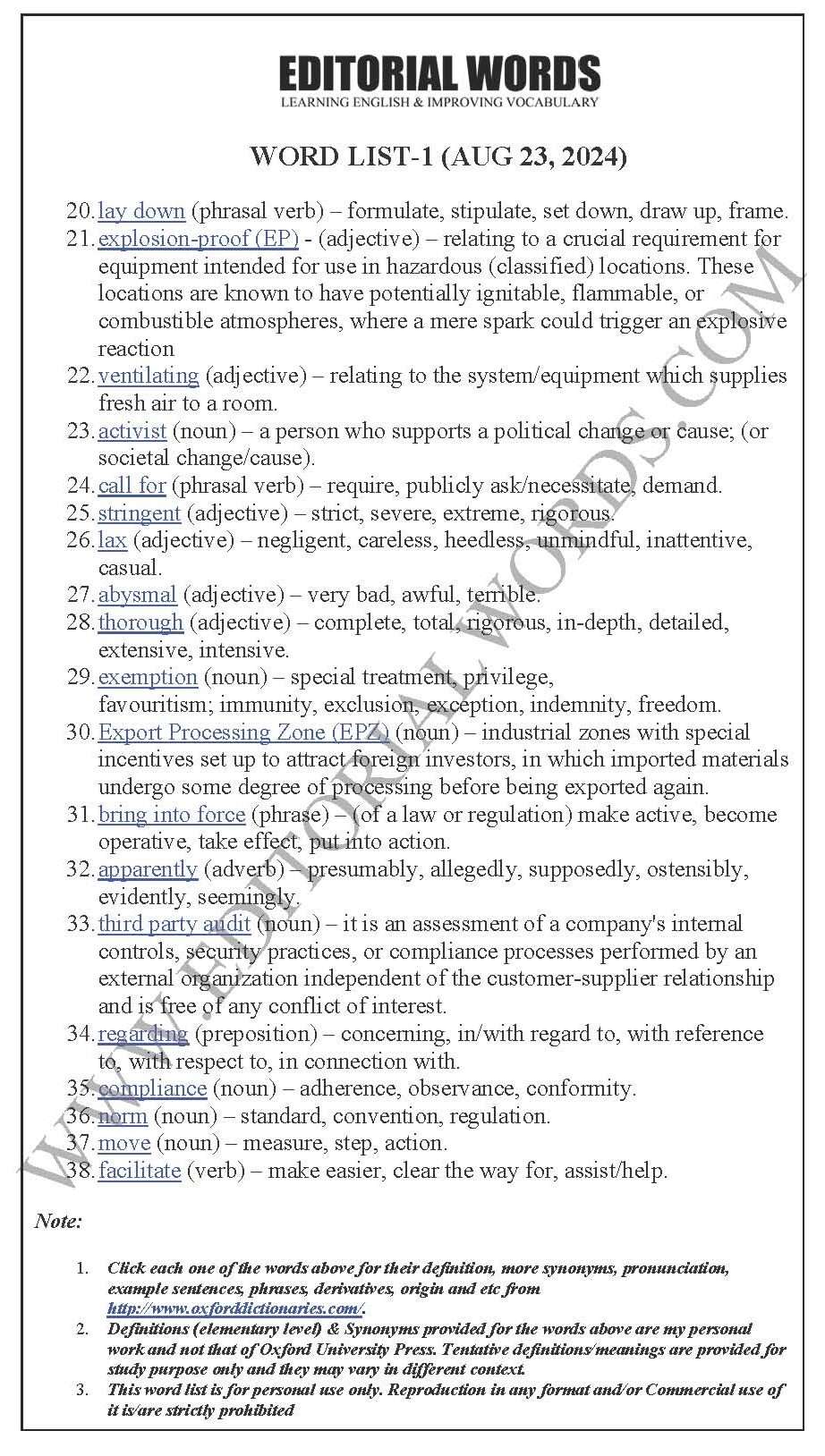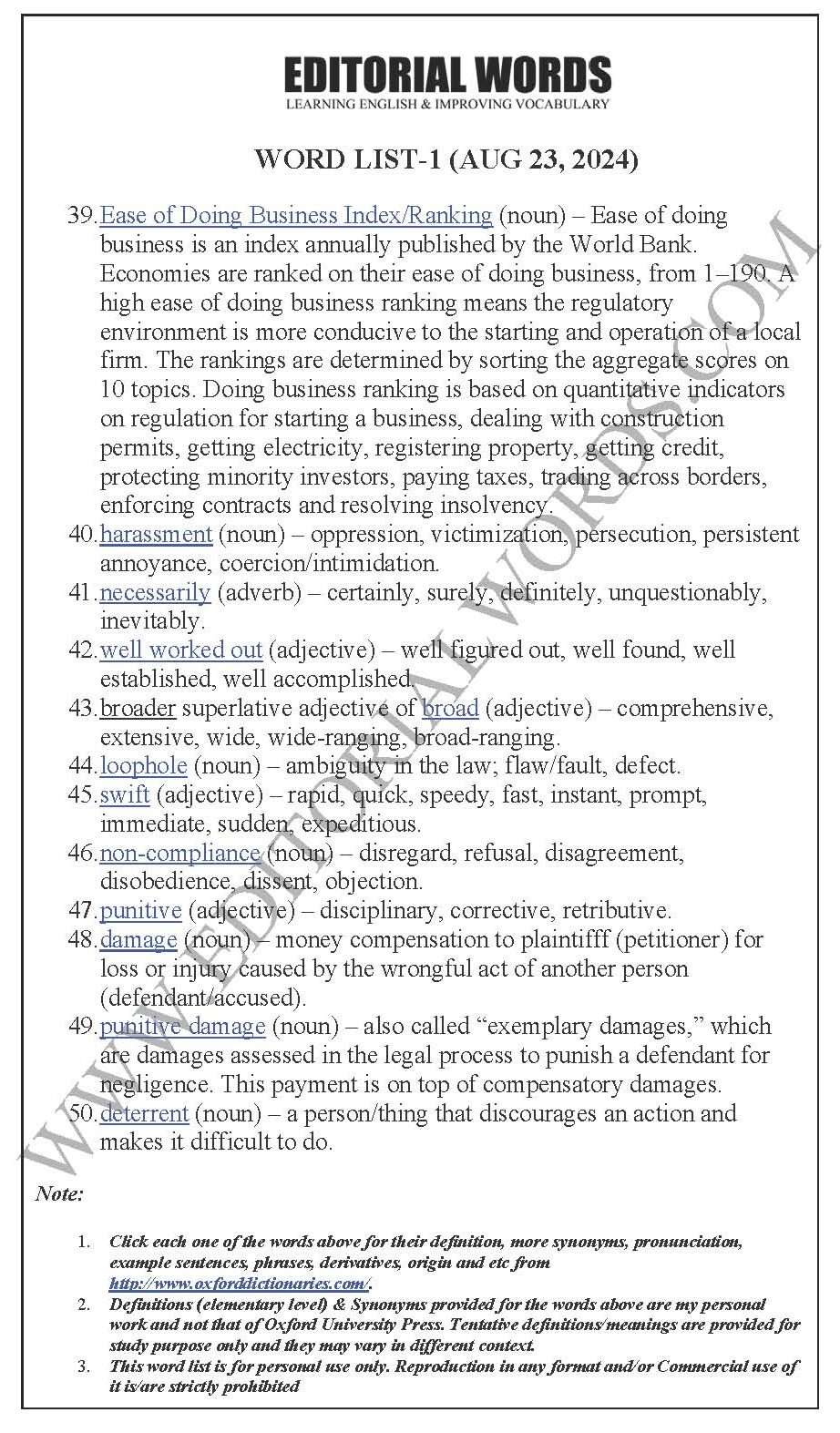The Hindu Editorial (Death at work) – Aug 23, 2024
To read this article, click “The Hindu”.
This preview is provided here with permission.
Courtesy: The Hindu
The Hindu Editorial (Death at work) – Aug 23, 2024:
- at work (phrase) – at one’s job or at one’s place of employment.
- audit (noun) – inspection, investigation, scrutiny.
- safety audit (noun) – a systematic review to analyze the risks and hazards in the workplace and evaluate the effectiveness and reliability of the safety procedures set up in the organization.
- special economic zone (SEZ) (noun) – Special economic zones (SEZs) are geographically delimited areas within which governments facilitate industrial activity through fiscal and regulatory incentives and infrastructure
support. SEZs are widely used across most developing and many developed economies. - explosion (noun) – blast, detonation, discharge, eruption, ignition, bowing up.
- rock (verb) – shock, stun, stagger, shake up, unnerve, disconcert.
- lead to (verb) – result in, cause, bring on, bring about, give rise to.
- home (noun) – place of origin, source, home ground.
- rash (noun) – series, succession, spate; a large number of similar things happening in quick succession.
- revive (verb) – bring back.
- styrene monomer (noun) – it is an important intermediate material used in the production of a variety of plastic and synthetic rubber products with key applications in various sectors. Styrene is a liquid hydrocarbon produced from ethylene and benzene.
- polymer (noun) – By definition, polymers are large molecules made by bonding (chemically linking) a series of building blocks. The word polymer comes from the Greek words for “many parts.” Each of those parts is scientists call a monomer (which in Greek means “one part”). For example, plastic water bottle is a polymer.
- outskirts (noun) – outlying part of a city; suburbs.
- state (noun) – condition.
- plug (verb) – stop, seal off, close off, block, fill, fill up, pack.
- solvent (noun) – A liquid that dissolves another substance or substances to form a solution.
- Methyl tert-butyl ether (MTBE) (noun) – it is a flammable liquid with a distinctive, disagreeable odor.
- personnel (noun) – staff, employee, worker.
- flammable (adjective) – relating to the substances that can be set fire to (with a source of ignition). Whereas inflammable can catch fire by themselves (without needing a source of ignition).
- lay down (phrasal verb) – formulate, stipulate, set down, draw up, frame.
- explosion-proof (EP) (adjective) – relating to a crucial requirement for equipment intended for use in hazardous (classified) locations. These locations are known to have potentially ignitable, flammable, or combustible atmospheres, where a mere spark could trigger an explosive reaction
- ventilating (adjective) – relating to the system/equipment which supplies fresh air to a room.
- activist (noun) – a person who supports a political change or cause; (or societal change/cause).
- call for (phrasal verb) – require, publicly ask/necessitate, demand.
- stringent (adjective) – strict, severe, extreme, rigorous.
- lax (adjective) – negligent, careless, heedless, unmindful, inattentive, casual.
- abysmal (adjective) – very bad, awful, terrible.
- thorough (adjective) – complete, total, rigorous, in-depth, detailed, extensive, intensive.
- exemption (noun) – special treatment, privilege, favouritism; immunity, exclusion, exception, indemnity, freedom.
- Export Processing Zone (EPZ) (noun) – industrial zones with special incentives set up to attract foreign investors, in which imported materials undergo some degree of processing before being exported again.
- bring into force (phrase) – (of a law or regulation) make active, become operative, take effect, put into action.
- apparently (adverb) – presumably, allegedly, supposedly, ostensibly, evidently, seemingly.
- third party audit (noun) – it is an assessment of a company’s internal controls, security practices, or compliance processes performed by an external organization independent of the customer-supplier relationship and is free of any conflict of interest.
- regarding (preposition) – concerning , in/with regard to, with reference to, with respect to, in connection with.
- compliance (noun) – adherence, observance, conformity.
- norm (noun) – standard, convention, regulation.
- move (noun) – measure, step, action.
- facilitate (verb) – make easier, clear the way for, assist/help.
- Ease of Doing Business Index/Ranking (noun) – Ease of doing business is an index annually published by the World Bank. Economies are ranked on their ease of doing business, from 1–190. A high ease of doing business ranking means the regulatory environment is more conducive to the starting and operation of a local firm. The rankings are determined by sorting the aggregate scores on 10 topics. Doing business ranking is based on quantitative indicators on regulation for starting a business, dealing with construction permits, getting electricity, registering property, getting credit, protecting minority investors, paying taxes, trading across borders, enforcing contracts and resolving insolvency.
- harassment (noun) – oppression, victimization, persecution, persistent annoyance, coercion/intimidation.
- necessarily (adverb) – certainly, surely, definitely, unquestionably, inevitably.
- well worked out (adjective) – well figured out, well found, well established, well accomplished.
- broader superlative adjective of broad (adjective) – comprehensive, extensive, wide, wide-ranging, broad-ranging.
- loophole (noun) – ambiguity in the law; flaw/fault, defect.
- swift (adjective) – rapid, quick, speedy, fast, instant, prompt, immediate, sudden, expeditious.
- non-compliance (noun) – disregard, refusal, disagreement, disobedience, dissent, objection.
- punitive (adjective) – disciplinary, corrective, retributive.
- damage (noun) – money compensation to plaintifff (petitioner) for loss or injury caused by the wrongful act of another person (defendant/accused).
- punitive damage (noun) – also called “exemplary damages,” which are damages assessed in the legal process to punish a defendant for negligence. This payment is on top of compensatory damages.
- deterrent (noun) – a person/thing that discourages an action and makes it difficult to do.
Note :
1. Click each one of the words above for their definition, more synonyms, pronunciation, example sentences, phrases, derivatives, origin and etc. from http://www.oxforddictionaries.com/.
2. Definitions (elementary level) & Synonyms provided for the words above are my personal work and not that of Oxford University Press. Tentative definitions/meanings are provided for study purposes only and they may vary in a different context.
3. This word list is for personal use only. Reproduction in any format and/or Commercial use of it is/are strictly prohibited.
The Hindu Editorial (Death at work) – Aug 23, 2024:



“Phrasal Verbs” We Learnt Last Week
“Idioms & Phrases” We Learnt Last Week
“Important Definitions” We Learnt Last Week
Recent Word Lists For The Hindu Editorial Articles

The blast at pharma company Escientia’s plant in the Atchutapuram Special Economic Zone (SEZ) in Anakapalli district, Andhra Pradesh, is the worst industrial accident in the region in recent times… For further reading, visit “The Hindu”. Below is today’s word list-1 for The Hindu Editorial (Death at work) – Aug 23, 2024.